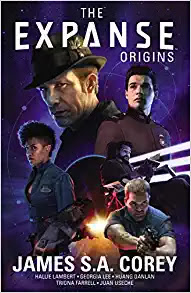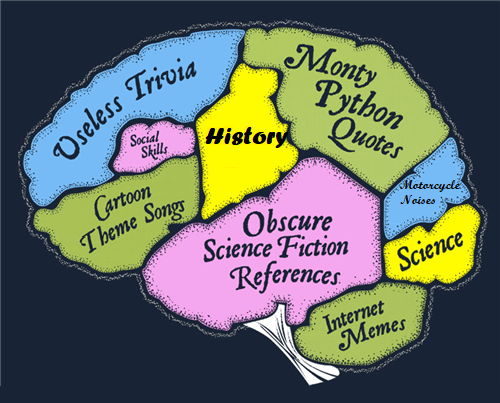The Expanse is a science fiction series of novels written by James S. A. Corey, the pen name for a collaboration between authors Daniel Abraham and Ty Franck. The Expanse story consists of nine main novels and eight shorter works (two prequel short stories, one prequel novella, one interquel short story, and four interquel novellas). The final novella is set after the main book series.
From 2015 to 2018 the Syfy network aired three seasons of adaptations of the The Expanse books, that roughly aligned with the first three books -- Leviathan Wakes, Caliban's War and novellas and short stories through Abaddon's Gate and The Vital Abyss. It is set several hundred years in the future, after humans from Earth have colonized Mars, the asteroid belt and several moons of the outer planets.
 |
| The crew of the Rocinante (left to right): Amos Burton, James Holden, Naomi Nagata and Alex Kamal |
It generally follows the adventures of the crew of a stolen Martian warship, the Rocinante, as humans deal with the discovery of a bizarre alien technology dubbed "the protomolecule," created two billion years ago by an alien civilization that has mysteriously vanished.
 |
| The protomolecule building...something...out of people on the asteroid Eros |
Syfy cancelled The Expanse after three seasons, but it was picked up by Amazon, which aired three more seasons aligned with the events in the next three books and short stories: Cibola Burn is covered by season 4, Nemesis Games is essentially Season 5 and Babylon's Ashes and Strange Dogs Season 6.
These three books and the corresponding three seasons produced by Amazon follow the crew of the Rocinante after the protomolecule opened of a "Ring Gate" beyond the orbit of Uranus. This is a wormhole that connects our Solar System with over 1300 systems with inhabitable planets, and the technology left behind by the mysterious "Ring Builders." Meanwhile an interplanetary war breaks out over who will control the access to this new frontier.
 |
| Passing through the Ring Gate |
The last three books -- Persepolis Rising, Tiamat's Wrath and Leviathan Falls make a leap into the future, picking up the story roughly thirty year after the war that ended Babylon's Ashes, with the reemergence of a renegade Martian faction that had escaped to an alien system with the only remaining protomolecule sample. This thirty-year shift between Books Six and Seven is a natural break in the action, and it is why the Amazon series stopped at Book Six.
 |
| The Martian corvette Rocinante |
Based on personal experience, I highly recommend both watching the television series AND reading the books.
My first memory of science fiction is when I was about 4-years old and I watched the original airing of Star Trek episode "The Doomsday Machine." I was never the same after that. By the mid-70s I was a full blown Trekkie. I read and re-read every single one of the James Blish book adaptations of Star Trek: TOS, and the Alan Dean Foster adaptations of The Animated Series. At recess we played "Star Trek landing party" and launched polystyrene models of Klingon battle cruisers and the USS Enterprise out the third-story window of my friend's apartment. In 1975 it was Space:1999. Martin Landau, Barbara Bain, Moonbase Alpha, a lunar nuclear holocaust on September 13, 1999 and models of Eagles and Hawks flying out the same friend's third-story window.
Then in 1977 -- the TV commercials for Star Wars. When they would come on, which wasn't that often, time seemed like it both slowed down and sped up. The movie looked like it was shot in real life compared with the cheesy special effects we were used to.
Near as I could figure, it was a world of Wookies and flying cities under attack shooting lasers.
My Uncle Bruce took me to see it that summer when it came out to wide release -- then I saw it again, and again, five or six more times that summer. Star Wars played at the Westerly Twin Cinema for over a year, only charging a buck a showing. One of my friends saw it over 100 times. Then I saw the first Alien movie the weekend it opened in theaters in 1979... By now I was reading Tolkien, Asimov, Frank Herbert and Harlan Ellison, Heinlein's Stranger In A Strange Land...and short stories like H.P. Lovecraft's The Colour Out Of Space and Alan Edward Nourse's Brightside Crossing.
So, yeah. By the time I was in high school I had watched and read a lot of really good science fiction. And even more that was not very good at all. I am not kidding when I say The Expanse is one of the best sci-fi series ever written, and ever adapted to the screen.
The story originally began in the 2000s as a failed MMORPG video game that morphed into a tabletop roleplaying game before taking the characters from the roleplaying game and using them as the basis of the crew of the Rocinante. The DM for the tabletop game, Ty Franck, and the role-player who developed the character of Detective Miller, Daniel Abraham, took on the pen name James S.A. Corey and started writing the first novel, Leviathan Wakes. The story, based on the characters and plot emerging from the roleplaying game, also took inspiration from Alien, Dune, Babylon 5, Frederick Pohl's HeeChee trilogy, Larry Niven, Alfred Bester... The first two books (I am paraphrasing here based on some interviews I watched on YouTube after Season Six concluded) are really a noir detective space opera with intense body horror that evolves into a political spy thriller. Books Three is a haunted house story and Four a frontier western. With death slugs. Books Five and Six are a coming-of-age story set in a disaster movie, and the last three novels are an epic fantasy trilogy ala The Tombs of Atuan. But since it is really well-written science fiction, the genre-hopping is only a means to an end. The overarching story -- human beings trying (and mostly failing) to use a nearly incomprehensible alien technology for human ends, and the intent of the Ring Builders, which was to wait millions and even billions of years for another race to come along so they could -- wait, no spoilers! -- all seen through the crew of the Rocinante. It is epic in scope with characters that develop a lived-in intimacy and a realistic sense of family over the decades and centuries that the story takes place
I started with watching the television series when it was on Syfy and then the final three seasons on Amazon. Originally I only bought the last three books to find out what happened after the end of the war between "the inners" and "the belters" at the end of Season Six. But the last three books were so rich an experience I decided to go back to the beginning. I bought and read Books One through Six even though I had already watched the television series and knew in broad strokes what was going to happen. The books are different enough from the television series to make it a worthwhile endeavor. The story in the books is NOT a word-for-word script for the television series. Some TV characters are amalgamations of several book characters, and other book characters never make it into the television series. And just because a character is alive in the books doesn't mean they will survive in the television series, and vice versa. But it is the internal dialogues of the main characters, told in first person perspectives in the books, that flesh out the character, their through processes and motivations far more realistically than how the plot was occasionally pushed forward in the television series in the interest of time, to the detriment of character motivation and story-telling.
What makes James Holden, Josephus Miller (both incarnations), Amos Burton, and Chrisjen Avasarala tick is more understandable while reading the books.
I rarely take time away from reading history associated with whatever I am currently teaching or researching. Years ago I read a LOT of sci-fi and fantasy for fun -- some was good, some was great but most was meh. I just don't have time for fiction that is not absolutely 100% worth the time invested.
These books are worthy of all the time they take. And they are relatively quick reads too. I highly recommend them, to one and all.
Also, watch the television series!
Publication order is the best order to read the series. Below is an in-universe, chronological list of all works, with the main series of novels in bold:
Drive: An Expanse Short Story (Nov 27, 2012)
The Churn: An Expanse Novella (April 29, 2014)
The Butcher of Anderson Station: An Expanse Short Story (Oct 17, 2011)
The Expanse #1: Leviathan Wakes (June 2, 2011)
The Last Flight of the Cassandra: A Story of The Expanse - (bonus short story in The Expanse Roleplaying Game; May 14, 2019)
The Expanse #2: Caliban's War (June 26, 2012)
Gods of Risk: An Expanse Novella (Sept 15, 2012)
The Expanse #3: Abaddon's Gate (June 4, 2013)
The Vital Abyss: An Expanse Novella (Oct 15, 2015)
The Expanse #4: Cibola Burn (June 5, 2014)
The Expanse #5: Nemesis Games (June 2, 2015)
The Expanse #6: Babylon's Ashes (Dec 6, 2016)
Strange Dogs: An Expanse Novella (July 18, 2017)
The Expanse #7: Persepolis Rising (Dec 5, 2017)
Auberon: An Expanse Novella (Nov 12, 2019)
The Expanse #8: Tiamat's Wrath (Mar 26, 2019)
The Expanse #9: Leviathan Falls (Nov 30, 2021)
The Sins of our Fathers: An Expanse Novella (Mar 15, 2022)
The Expanse #10: Memory's Legion (March 15, 2022) - Compendium of most novellas and short stories
The Expanse Origins is a digital comic miniseries and soft-cover graphic novel that serves as a prequel to The Expanse television series, reveals the untold origins of the four crew members of The Rocinante as well as Detective Josephus Miller. It was released between February and July 2017 and compiled into a single print volume in February 2018.
An interquel 4-issue miniseries, set between Season 4 and Season 5 of the TV series and just called The Expanse, was released between December 2020 and March, 2021 and compiled into a single print volume in August 2021.






